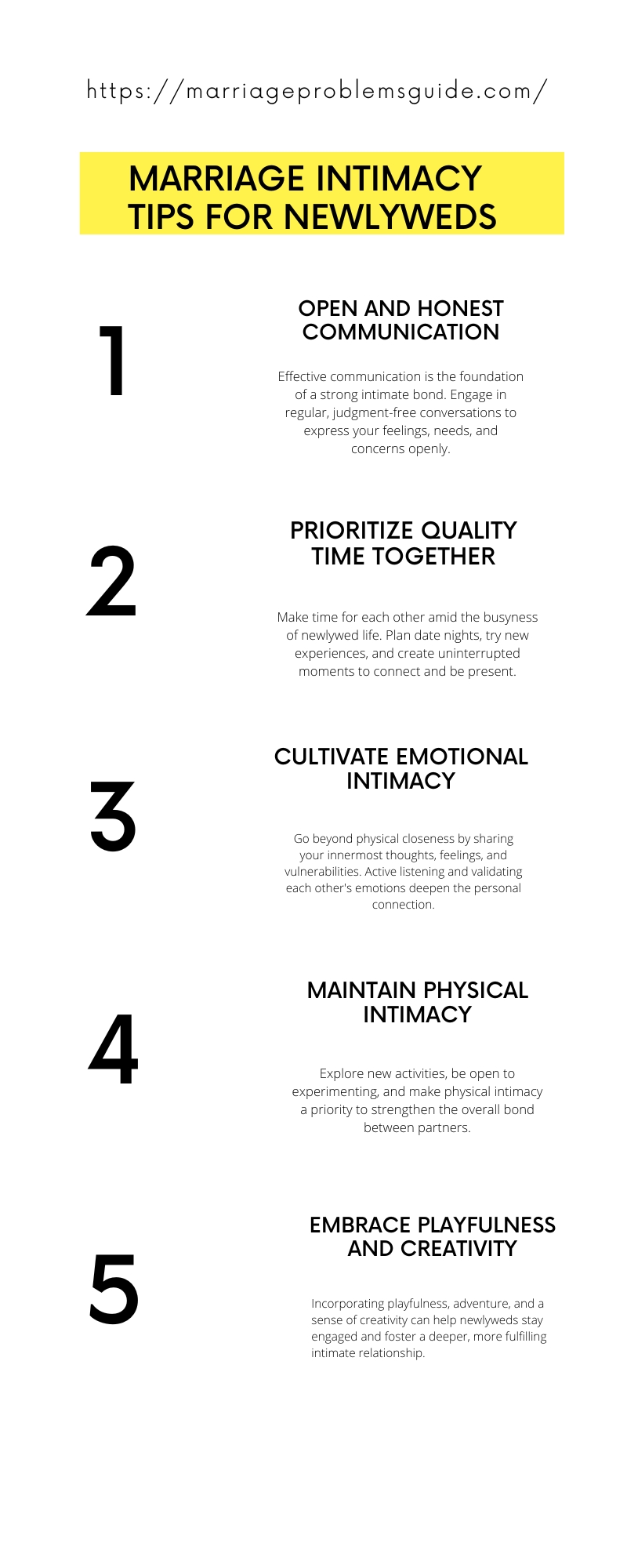Marriage is a profound and transformative journey that brings two individuals together in a lifelong partnership. As newlyweds embark on this new chapter, building a strong and fulfilling intimate connection is essential for a healthy and vibrant marriage.
In this blog post, we will explore practical tips and strategies to help newlyweds cultivate intimacy and deepen their emotional and physical bond.
Understanding the Importance of Intimacy in Marriage
Intimacy in marriage is not just about physical closeness; it encompasses emotional, mental, and spiritual connections as well. A strong intimate bond can foster a sense of trust, communication, and mutual understanding, which are the foundation of a thriving marriage.
Newlyweds who prioritize intimacy are more likely to experience greater overall marital satisfaction, deeper emotional fulfillment, and a stronger sense of unity.
The Benefits of Intimacy in Marriage
- Emotional Intimacy: Cultivating a deep emotional connection can help newlyweds feel understood, valued, and supported, leading to a stronger sense of trust and security in the relationship.
- Physical Intimacy: Maintaining a healthy, fulfilling physical relationship can enhance feelings of closeness, pleasure, and overall well-being for both partners.
- Spiritual Intimacy: Sharing a deep spiritual bond can foster a sense of unity, purpose, and a shared journey in the marriage.
- Improved Communication: Intimate communication can help newlyweds effectively express their needs, desires, and concerns, leading to a more open and understanding relationship.
Tips for Building Intimacy in Marriage
1. Communicate Openly and Honestly
Effective communication is the foundation of a strong intimate connection. Newlyweds should strive to create an environment where they feel comfortable expressing their feelings, desires, and concerns openly and without judgment.
This can involve setting aside dedicated time for meaningful conversations, actively listening to each other, and being willing to address any issues or concerns directly.
2. Prioritize Quality Time Together
In the midst of the excitement and busyness of newlywed life, it’s essential for couples to make time for each other. This can involve planning regular date nights, engaging in new experiences together, or simply setting aside uninterrupted time to connect and be present with one another.
3. Cultivate Emotional Intimacy
Emotional intimacy goes beyond physical closeness and involves a deep understanding and connection on a personal level. Newlyweds can foster emotional intimacy by sharing their innermost thoughts, feelings, and vulnerabilities, as well as by actively listening and validating each other’s emotions.
4. Maintain Physical Intimacy
Physical intimacy is an important aspect of marriage, and newlyweds should strive to maintain a healthy and satisfying intimate life. This can involve experimenting with new activities, being open to exploring each other’s desires, and making physical intimacy a priority in the relationship.
5. Practice Affection and Appreciation
Small gestures of affection, such as hugs, kisses, and words of appreciation, can go a long way in strengthening the intimate bond between newlyweds. Regularly expressing gratitude, complimenting each other, and showing physical affection can help reinforce the sense of connection and mutual admiration.
6. Embrace Playfulness and Creativity
Incorporating playfulness, creativity, and a sense of adventure into the relationship can help newlyweds stay connected and engaged. This can involve trying new activities together, engaging in playful banter, or exploring new ways to express their intimacy.
7. Seek Professional Support if Needed
If newlyweds are experiencing challenges in building or maintaining intimacy, it’s important to seek professional support, such as a couples therapist or counselor. These professionals can provide valuable guidance and tools to help couples overcome obstacles and strengthen their intimate bond.
Overcoming Challenges to Intimacy
While building intimacy in marriage is a rewarding and fulfilling journey, newlyweds may face various challenges along the way. Some common obstacles include:
- Communication Breakdowns: Difficulty expressing feelings, needs, or concerns can hinder the development of intimacy.
- Stress and Exhaustion: The demands of daily life, work, and adjusting to a new marriage can strain the intimate connection.

- Unresolved Conflicts: Unaddressed conflicts or resentments can create barriers to emotional and physical intimacy.
- Unrealistic Expectations: Comparison to societal or media-driven ideals of intimacy can lead to disappointment and dissatisfaction.
- Past Traumas or Baggage: Unresolved personal issues or past experiences can impact a person’s ability to be vulnerable and intimate.
To overcome these challenges, newlyweds should be willing to seek professional support, practice empathy, and remain committed to working through any obstacles together.
Maintaining Intimacy Throughout Marriage
Building intimacy is an ongoing process that requires continuous effort and attention. As newlyweds transition into the later stages of marriage, it’s essential to adapt and evolve their approach to intimacy to ensure it remains a vibrant and fulfilling aspect of their relationship.
1. Adapting to Life Changes
Throughout the marriage, newlyweds will face various life changes, such as the addition of children, career transitions, or health challenges. Adapting their intimate practices to accommodate these changes can help maintain a strong, resilient bond.
2. Introducing Novelty and Spontaneity
Incorporating new activities, experiences, and spontaneity into the relationship can help prevent intimacy from becoming stagnant or routine. Newlyweds should be willing to step out of their comfort zones and explore new ways to connect.
3. Practicing Mutual Respect and Understanding
As the marriage matures, maintaining a deep sense of respect, understanding, and acceptance for each other’s needs and boundaries is crucial for preserving intimacy.
4. Seeking Ongoing Learning and Growth
Continuously educating themselves about intimacy, exploring new resources, and engaging in personal growth can help newlyweds navigate the evolving dynamics of their relationship.
Conclusion
Cultivating intimacy in marriage is a multifaceted and ever-evolving journey for newlyweds.
By prioritizing open communication, quality time together, emotional and physical closeness, and a willingness to overcome challenges, newlyweds can build a strong, resilient, and fulfilling intimate bond that will sustain them throughout their marriage.
Remember, intimacy is not just a destination, but a continuous process of learning, growth, and deepening connection.

Additional Resources:
1.No Intimacy in Marriage from Husband: Addressing a Common Challenge
2.Ignite the Spark: Couples’ Shared Experiences for a Deeper Bond
3.Fun Communication Games for Couples: Deepen Your Bond & Spice Up Your Relationship
4.Rekindle the Spark: Effective Intimacy Exercises for Couples to Reconnect






